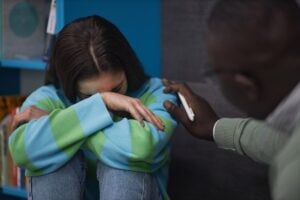
What Is Childhood Toxic Stress?
This blog offers some information about our stress response system, toxic stress, and how it affects young people. It also provides some advice for caregivers supporting children in very stressful contexts.
Fiona Yassin is the International Program Director at The Wave, holding multiple credentials including being a registered Psychotherapist and Accredited Clinical Supervisor in both the U.K. and UNCG (Registration number #361609 National and International Council of Psychotherapists). She is EMDR trained (EMDRIA) and practices as a Trauma therapist (Registration number #10000054651).
Fiona’s expertise includes being a member of the International Chapter of IAEDP, with training in CBTe (Oxford Group), FREED (King’s College, London), TF-CBT, RO-DBT, and GPM. Her specializations cover the treatment of Eating Disorders and Borderline Personality Disorder, as well as families in High Conflict Divorces and Psychiatry across the female lifespan.
Additionally, Fiona holds the distinction of being a Fellow of APPCH, a senior accredited Addiction Professional, and a member of The Association of Child Protection Professionals. She is also trained in MBT (Child and Family and Adult) and Reflective Parenting with The Anna Freud Centre for Children and Families, and is a Member of The Australia and New Zealand Eating Disorders Association.
Fiona holds an MSc in Neuroscience and Mental Health awarded by King’s College London, where she received The Dean’s Award. She is currently completing an MSc in Psychiatry at Cardiff University Medical School and is a PhD Candidate in Mental Health Research at Lancaster University. Outside of her professional pursuits, she enjoys spending time with her three cats, going for long walks on the beach, and appreciating the beautiful animals in her garden.

This blog offers some information about our stress response system, toxic stress, and how it affects young people. It also provides some advice for caregivers supporting children in very stressful contexts.
Social media use can quickly become problematic, developing into addictive behaviours and contributing to mental health problems like low self-esteem, anxiety, and depression.

Age-appropriate content is suitable for a young person’s developmental age, cognitive skills, and social maturity. It considers the kinds of information that young people can

Despite the prevalence of teen drug use in the UAE, widespread prevention strategies are still lacking. Both adolescents and experts highlight the need for school-based prevention programs and parental support to help young people stay safe and identify and support young people who may be using substances harmfully.

In this blog, we offer some information about the impact of compulsive sexual behaviours on children and the family system as a whole. We outline The Wave Clinic’s pioneering family and child intensives that offer unique and valuable support for young people affected by sex addiction.

Dialectical behavioural therapy is a type of talking therapy originally designed for adults with borderline personality disorder. Since then, it has been adapted for treatment among adolescents and offered for a wide range of mental health concerns, including eating disorders, self-harm, and emotional dysregulation. Usually delivered in outpatient settings, studies have shown that DBT is highly effective in improving young people’s mental health symptoms and quality of life.

Online gaming and online pornography consumption are both common among young people. And both activities can be harmful, whether they’re engaged in casually or develop into problematic behaviours. In this blog, we explore the consequences of online gaming and pornography use for young people’s mental health, and examine the link between the two.

This blog offers some information on alcohol use among young people with eating disorders, including anorexia. It also outlines the kind of treatment available for teenagers living with anorexia nervosa and alcohol use disorder.

It’s normal for adolescents to experience a range of emotions, including distressing feelings. But sometimes young people experience emotions that are so intense that they

Explore how Internal Family Systems (IFS) therapy in residential treatment helps young people and families heal by welcoming all parts of the self.

When a young person develops very low self-worth, they can feel like they don’t deserve to have a clean and tidy room. If they feel hopeless about life, or like nothing has meaning, they might feel like there’s no point in keeping their space organised. Fatigue, another common symptom of depression, can leave young people struggling to find the energy to complete even simple self-care tasks.

Before teenagers begin to reprocess traumatic events, they have to be able to access these memories, thoughts, and emotions safely. The preparation phase of EMDR supports teenagers in developing distress tolerance skills that help them cope with the pain connected with traumatic memories. It also helps them to access suppressed emotions and feelings in their bodies.

In this blog, we look at how narcissistic abuse from one parent to the other impacts the family system, leading children to take on the role of parents. We also outline the long-term harm this can cause for young people’s mental health.








Have any questions or want to get started with the admissions process? Fill in the form below and we’ll get back to you as soon as possible.